1952-53: Stalin
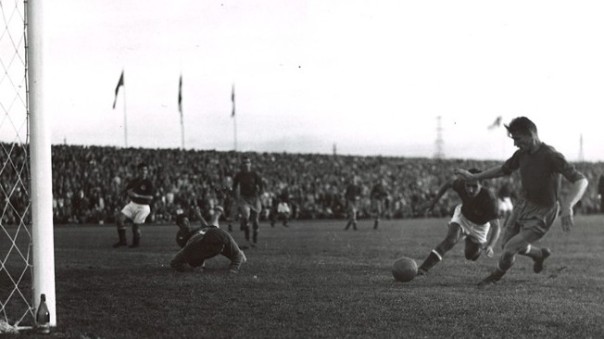
Vsevolod Bobrov (at right) scores one of his three goals against Yugoslavia at the 1952 Olympics. (Image Source)
Vsevolod Bobrov, reigning scoring champion of Soviet hockey, had a very fine time in the summer of 1952. While the country’s hockey powers had decided to give the Winter Olympics a miss, the USSR did send athletes to the Summer Games in Helsinki — the first time since 1912 that Russians had taken part. Bobrov went along, as a key part of the Soviet soccer team, and on July 20th against Yugoslavia he put on one of the great individual displays in Olympic soccer history. With the Soviet Union trailing 5-1 and only 15 minutes left to play, Bobrov, who had already scored his country’s only goal, tallied twice more himself and played set-up man for two other goals, as the USSR rallied to a 5-5 tie. However, the result was not enough to get the Soviets a medal, and the reaction of the Ministry of Sport was one of fury. The Red Army team, which had supplied most of the players, was temporarily disbanded, and the press made no mention of that national team’s performance at the Olympics.
Bobrov, however, escaped any of that fall-out, by virtue of the fact that he played for VVS MVO Moscow, the team of the Soviet Air Force. His close friendship with Vasily Stalin, manager of the team and son of Josef Stalin, no doubt helped as well. In any case, as the 1952-53 hockey season approached, Bobrov and his team-mates would look to win their third national title in row. Below the jump, we’ll find out if they did it, and explore a season that ended with an unforeseen twist…
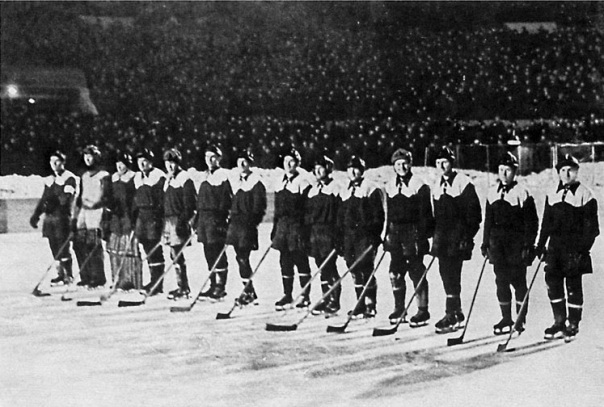
Dynamo Moscow in 1952-53. (Image Source)
The Soviet Championship expanded to 17 teams for 1952-53, adding clubs in Elektrostal, Perm, Gorky, Novosibirsk, and Kaunas. There had been, once again, no relegation the previous year, which meant that Spartak Minsk were now entering their third season in the top flight without ever having won a game. That unenviable streak finally came to an end in late 1952, when the men from Minsk thrashed the newcomers from Perm (the team known as “SK Sverdlova Molotov”) by a score of 7-2.
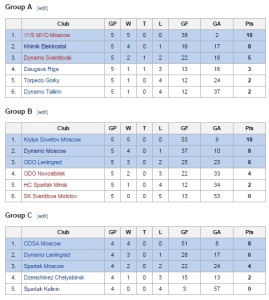
Preliminary Round standings in 1952-53 (Click to see larger version). Note that “Spartak Kalinin” — 5th in Group C — is an error. That should be Spartak Kaunas. (Image Source)
As usual, the season began with a preliminary round, with the teams divided into three groups. The top three from each would advance to a championship round. And the first stage played out much as expected, with VVS MVO, the Red Army club CDSA Moscow, and Krylya Sovetov Moscow coming out on top of their respective groups. The other big Moscow teams also advanced; Dynamo finished second behind Krylya Sovetov, while Spartak struggled to a third-place finish in the group won by CDSA. The one big surprise was the performance of newcomers Khimik Elektrostal, who went 4-1 to finish second behind VVS MVO and become the only one of the league’s new teams to advance to the championship round. Those who finished outside the top three in each group were consigned to a consolation round, which was won by the Latvians of Daugava Riga.
However, there was one development in the preliminary round that boded ill for the Air Force’s chance of a third successive title: Bobrov got hurt. His knees were always a concern by this stage, and the latest injury would rule him out for the remainder of the season. While his linemates, Viktor Shuvalov and Yevgeny Babich, were formidable talents in their own rights, and the team could further boast superb goaltending and defense, the loss of Bobrov was still a massive one, and spirits must have risen among VVS MVO’s rivals at the news.
The nine-team championship group in 1952-53, which would feature each squad playing each other squad twice, quickly turned into a fantastic four-team struggle at the top of the table. It was fought among the capital city teams of VVS MVO, CDSA, Dynamo, and Krylya Sovetov, and they finished with only three points separating the four of them. It was Krylya Sovetov who suffered the heartbreak of ending up just out of the medals, with a 4-3 loss to Khimik Elektrostal proving the major culprit. Dynamo claimed the bronze in the end, and would have finished higher had they managed better than a loss and a draw against Krylya Sovetov. So the top two spots were again contested between the Air Force and the Army, and once again — despite the injury to Bobrov — it was VVS MVO who came out on top. In the head-to-head matchup between the two, one game ended at one goal apiece, while Vasily Stalin’s men won the other 4-0, and that proved to be the difference (both teams had been beaten once by Dynamo). VVS MVO finished first by a point, claiming their third straight gold medal and ruling out any need for a repeat of the previous season’s tiebreaking game.
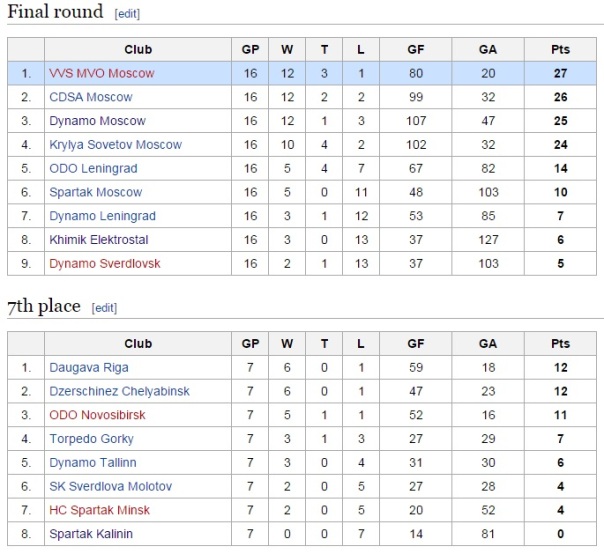
Final round standings in 1952-53. Once again, that should be Spartak Kaunas in place of Spartak Kalinin, and for “7th place” read “10th-17th place.” (Image Source)
Much, indeed most, of the credit for VVS MVO’s victory must go to Viktor Shuvalov, Bobrov’s oft-overlooked partner. In the superstar’s absence, Shuvalov stepped up in a big way, scoring a whopping 44 goals in 21 games to lead all marksmen in the Soviet championship. In second place was a relatively unknown figure: Belyai Bekyashev of ODO Leningrad (now SKA St. Petersburg), whose 26 goals helped his team to an impressive fifth-place finish. Krylya Sovetov’s always-dangerous Alexei Guryshev finished third among scorers.
VVS MVO had the title secured, but the drama of the season was by no means over. The third edition of the Soviet Cup got underway in early 1953, and the Air Force men were looking to defend their title in that competition as well. This time, however, they came up short, falling out of the tournament at the semi-final stage thanks to a 3-2 loss to Dynamo Moscow, who went on to claim the Cup in the Final against Red Army. More importantly, that semi-final loss against Dynamo marked the end of VVS MVO Moscow; the team never played another game.
On March 5th, 1953, Josef Stalin died at his dacha near Moscow. The dictator’s death ushered in a sometimes-bloody struggle for political power in the USSR, along with the beginning of the reforms that would later become known as destalinizatsiya — “destalinization.” Among the early casualties of these processes was the sports club run by Josef Stalin’s son. The Air Force teams, soccer and hockey alike, were disbanded. On the hockey side, almost all of the players, including the great line of Bobrov, Shuvalov, and Yevgeny Babich, were sent to Anatoly Tarasov’s Red Army team (this must have been a bitter pill for Bobrov, as the dislike between him and Tarasov was reportedly profound and mutual). Along with the big trio went both of the Air Force’s superb goalies (Grigory Mkrtychan and Nikolai Puchkov), solid defenseman Alexander Vinogradov, and others. Perhaps the only player who was not sent to Red Army was young Viktor Tikhonov, who instead found himself with Dynamo Moscow. It was in Dynamo’s system, much later, that he would take his first steps towards the coaching renown and notoriety he eventually achieved.
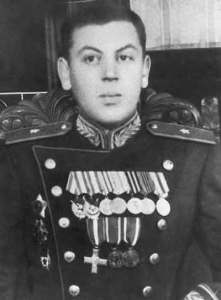
Vasily Stalin. (Image Source)
As for Vasily Stalin himself, his fate was grimmer. With the protection afforded him by his last name now gone, he was accused of insulting Communist Party officials and other such things, and sent to a labour camp. Although released and awarded a pension in 1960, he did not live long to enjoy it, dying in 1962 just before his 41st birthday. It is hard not to feel some empathy for the younger Stalin — all indications are that he was absolutely terrified of his father (with good reason!), and yet Josef Stalin’s death actually made things worse for him. Much later, in 1991, a Soviet film entitled Мой лучший друг генерал Василий, сын Иосифа (“Moi Luchshy Drug General Vasily, Syn Iosifa” — “My Best Friend General Vasily, Son of Josef“) dealt with the friendship between Vasily Stalin and Vsevolod Bobrov, the latter represented by a thinly-disguised avatar named “Vsevolod Bagrov.”
It had been the intention the Soviet hockey brass that the country should participate in the 1953 IIHF World Championship in Switzerland. The tournament began on March 7th, only two days after Stalin’s death, but even well before that the decision had been made that the USSR would sit out another year. Mindful of the harsh reaction to the soccer team’s failure at the 1952 Olympics, not to mention of Bobrov’s injury woes, those in authority were reluctant to take the risk. They did, however, send observers, including Anatoly Tarasov. In the end, the tournament turned out to be a bit of a dud. The Soviets joined the Canadians and Americans in foregoing the competition, and the powerful Czechoslovakian squad withdrew after that country’s President died on March 14th, ironically of pneumonia contracted at Stalin’s funeral. Those absences left only three teams — Sweden, West Germany, and Switzerland — taking part, and the Swedes won it easily.
And so ended one of the Soviet Championship’s first great dynasties. However, we have not heard the last of Bobrov, Shuvalov, Babich, and the rest — next time in this series, we’ll look at 1953-54, and see how they were getting along under Tarasov’s tutelage at Red Army!
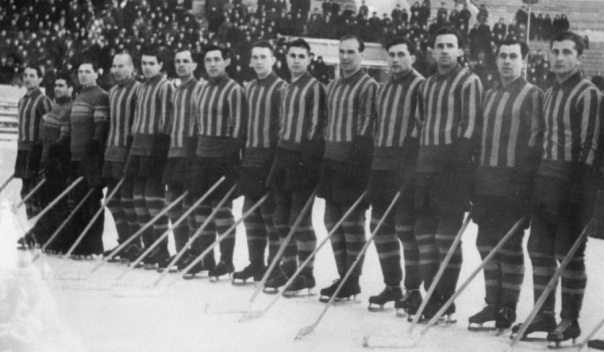
The last edition of VVS MVO Moscow, without Bobrov. Left to right: Yevgeny Babich, Grigory Mkrtychan, Nikolai Puchkov, Viktor Shuvalov, Vitaly Artemyev, Pavel Zhiburtovich, Alexander Vinogradov, Mikhail Ryzhov, Viktor Tikhonov, Pyotr Kotov, Vladimir Novozhilov, Anatoly Viktorov, Igor Gorshkov, Revold Leonov. (Image Source)
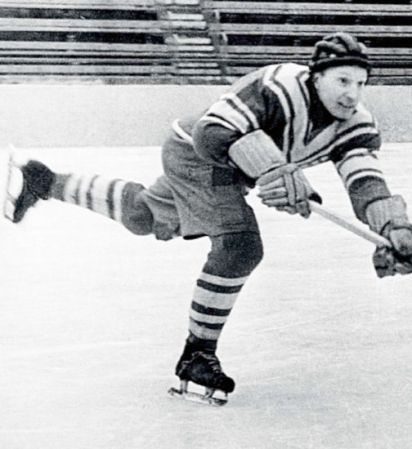
Pingback: The Doctor | CONWAY'S RUSSIAN HOCKEY BLOG